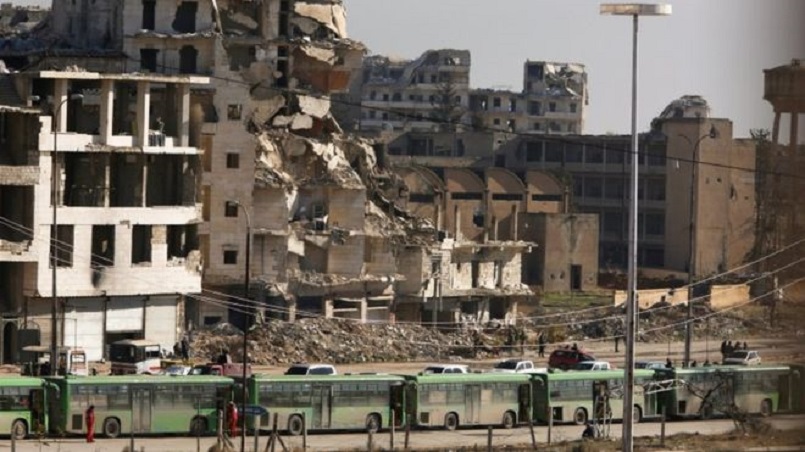
Hopes have risen that a planned evacuation of rebel-held parts of the Syrian city of Aleppo will begin soon, after an earlier deal collapsed.
Rebel sources said a new truce had been in effect from 03:00GMT and evacuations would take place on Thursday.
Russia's defence ministry and sources from Syria's army and the Hezbollah group said preparations were under way.
One convoy of ambulances did try to leave but was shot at and had to turn back, rebel sources said.
Rebel fighters and civilians had been due to leave the city early on Wednesday, but a ceasefire collapsed.
Syrian state TV said "4,000 rebels and their families would be evacuated from eastern districts on Thursday", adding that "all the procedures for their evacuation are ready".
A media unit run by Hezbollah, the Lebanese Shia Muslim movement backing the Syrian government, said there had been "big complications" but that "intensive contacts between the responsible parties... led to re-consolidating a ceasefire to exit armed fighters from eastern districts in the next few hours".
Soldiers from Russia - Syria's ally - would lead the rebels out, escorting them along a corridor towards Idlib city on buses and ambulances, with surveillance drones monitoring the situation, a statement from the Russian Centre for the Reconciliation of Opposing Sides in Syria, part of Russia's ministry of defence, said.
The buses will reportedly leave Aleppo on the road through the government-controlled south-western district of Ramousseh to the rebel-held town of Khan Touman, about 8km (5 miles) away.
The statement also said that Syrian authorities had guaranteed the safety of all members of the armed groups who decided to leave Aleppo.
The BBC's Sarah Rainsford in Moscow says that the phrasing "on the orders of President Putin" in the statement is significant, apparently underlining the country's commitment to the deal.
The Red Cross and Syrian Arab Red Crescent confirmed they would be involved in the operation to evacuate wounded but that it had not yet started.
Ismail al-Abdullah, a volunteer for the White Helmets civil defence group, told the BBC that buses had now entered the area in which he was working and that he hoped the evacuation would now take place.
But the White Helmets tweeted that one senior volunteer had been shot and injured by a sniper while clearing an evacuation route for ambulances. In a separate tweet, the group said it was suspending its evacuation operation.
An ambulance service official in eastern Aleppo said one convoy of ambulances did leave but had been shot at, with three people injured. An opposition source told the BBC the convoy had headed back to eastern Aleppo.
BBC Arabic's Asaf Aboud, in Aleppo, says there was some shelling by rebels and air strikes by government forces overnight.
The new deal should allow the simultaneous evacuation of two villages - Foah and Kefraya - being besieged by rebels in north-western Syria.
Syria's government and its ally Iran had insisted the evacuation from eastern Aleppo could happen only when those villages were evacuated.
On Wednesday morning, buses and ambulances had been brought to evacuate rebel fighters and their families - only to be turned away shortly afterwards.
Hours after the first agreement - brokered mainly by Russia and Turkey - collapsed, air strikes resumed over rebel-held territory, where up to 50,000 civilians remain.
It is not clear how many rebel fighters remain in the besieged areas. UN envoy Staffan de Mistura said there were approximately 1,500, about 30% of whom were from the jihadist group formerly known as the al-Nusra Front.
The UN said raids by the Syrian government and its allies on an area "packed with civilians" most probably violated international law.
The BBC has learned that Western forces are using satellites and unmanned aircraft to gather evidence of possible war crimes in Aleppo and elsewhere in Syria.
